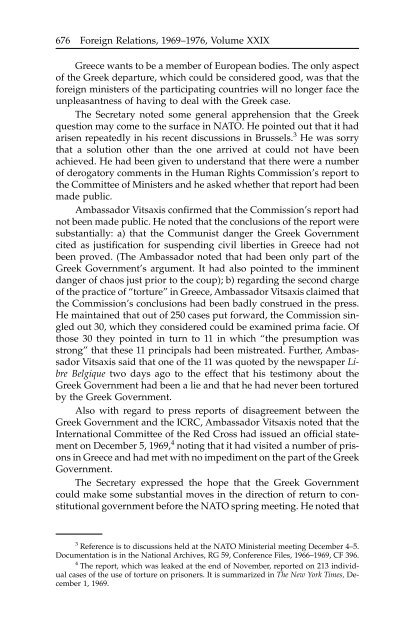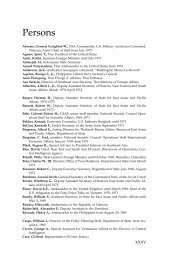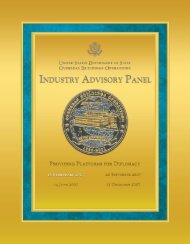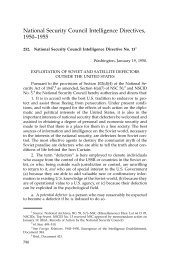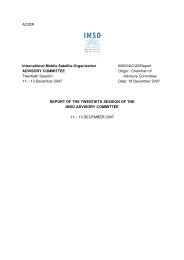Greece - US Department of State
Greece - US Department of State
Greece - US Department of State
You also want an ePaper? Increase the reach of your titles
YUMPU automatically turns print PDFs into web optimized ePapers that Google loves.
676 Foreign Relations, 1969–1976, Volume XXIX<br />
<strong>Greece</strong> wants to be a member <strong>of</strong> European bodies. The only aspect<br />
<strong>of</strong> the Greek departure, which could be considered good, was that the<br />
foreign ministers <strong>of</strong> the participating countries will no longer face the<br />
unpleasantness <strong>of</strong> having to deal with the Greek case.<br />
The Secretary noted some general apprehension that the Greek<br />
question may come to the surface in NATO. He pointed out that it had<br />
arisen repeatedly in his recent discussions in Brussels. 3 He was sorry<br />
that a solution other than the one arrived at could not have been<br />
achieved. He had been given to understand that there were a number<br />
<strong>of</strong> derogatory comments in the Human Rights Commission’s report to<br />
the Committee <strong>of</strong> Ministers and he asked whether that report had been<br />
made public.<br />
Ambassador Vitsaxis confirmed that the Commission’s report had<br />
not been made public. He noted that the conclusions <strong>of</strong> the report were<br />
substantially: a) that the Communist danger the Greek Government<br />
cited as justification for suspending civil liberties in <strong>Greece</strong> had not<br />
been proved. (The Ambassador noted that had been only part <strong>of</strong> the<br />
Greek Government’s argument. It had also pointed to the imminent<br />
danger <strong>of</strong> chaos just prior to the coup); b) regarding the second charge<br />
<strong>of</strong> the practice <strong>of</strong> “torture” in <strong>Greece</strong>, Ambassador Vitsaxis claimed that<br />
the Commission’s conclusions had been badly construed in the press.<br />
He maintained that out <strong>of</strong> 250 cases put forward, the Commission singled<br />
out 30, which they considered could be examined prima facie. Of<br />
those 30 they pointed in turn to 11 in which “the presumption was<br />
strong” that these 11 principals had been mistreated. Further, Ambassador<br />
Vitsaxis said that one <strong>of</strong> the 11 was quoted by the newspaper Libre<br />
Belgique two days ago to the effect that his testimony about the<br />
Greek Government had been a lie and that he had never been tortured<br />
by the Greek Government.<br />
Also with regard to press reports <strong>of</strong> disagreement between the<br />
Greek Government and the ICRC, Ambassador Vitsaxis noted that the<br />
International Committee <strong>of</strong> the Red Cross had issued an <strong>of</strong>ficial statement<br />
on December 5, 1969, 4 noting that it had visited a number <strong>of</strong> prisons<br />
in <strong>Greece</strong> and had met with no impediment on the part <strong>of</strong> the Greek<br />
Government.<br />
The Secretary expressed the hope that the Greek Government<br />
could make some substantial moves in the direction <strong>of</strong> return to constitutional<br />
government before the NATO spring meeting. He noted that<br />
3 Reference is to discussions held at the NATO Ministerial meeting December 4–5.<br />
Documentation is in the National Archives, RG 59, Conference Files, 1966–1969, CF 396.<br />
4 The report, which was leaked at the end <strong>of</strong> November, reported on 213 individual<br />
cases <strong>of</strong> the use <strong>of</strong> torture on prisoners. It is summarized in The New York Times, December<br />
1, 1969.


